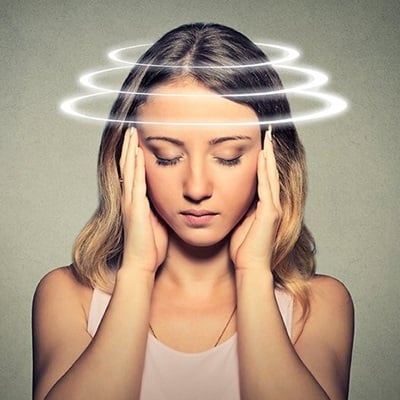Head Injuries and Pain

Treating dizziness and headaches
NovaCare Rehabilitation takes a team approach to symptoms relating to dizziness and headaches, providing treatment plans tailored to each patient’s unique condition and overall goals.
Our team offers expert, compassionate care for patients experiencing limitations associated with:
- Vertigo and dizziness
- Concussions
- Difficulties with imbalance
Regardless of the cause of your symptoms, the NovaCare Rehabilitation team will listen and work with you to create a personalized treatment plan to get you on the road to recovery.
Head injuries we treat
-
Vertigo and dizziness can arise from many causes and, in most cases, involves the inner ear. Sometimes you may hear vertigo and dizziness used interchangeably; however, there is a difference. Vertigo involves a sensation of seeing the room quickly spin, while dizziness captures most other sensations.
- Additional symptoms of vertigo and dizziness may include:
- A loss of balance or unsteadiness
- A sense that you or your surroundings are spinning or moving
- Blurred vision when you are moving
- Nausea
- Vomiting
Benign paroxysmal positional vertigo (BPPV) is the most common cause of vertigo and causes brief episodes of severe dizziness because of debris in your inner ear.
With vestibular rehabilitation, our goal is to minimize your vertigo and dizziness, improve your balance and prevent falls by restoring function to your inner ear.
One treatment option is a positioning procedure that clears debris from your inner ear. Our therapists will work to determine the right treatment for your unique symptoms and the specific cause of the vertigo and dizziness.
-
A concussion can result from a bump, strike or jolt to your head, neck or body and causes an impulsive force to your brain temporarily changing the way it functions. Symptoms of a concussion can include:
- Balance issues
- Blurred vision
- Difficulty concentrating
- Dizziness
- Double vision
- Drowsiness
- Headaches
- Irritability or mood swings
- Sensitivity to light
- Sensitivity to noise
Our concussion rehabilitation program can help. Your treatment plan will be determined by the root cause of your symptoms and help you heal.
-
Difficulties with balance and gait (walking) are very common. Due to the complexity of our sensory symptoms, you can have imbalance and trouble with walking from a specific medical diagnosis or, sometimes, you can have them because your sensory symptoms aren’t communicating well. You can also feel these limitations with weakness, especially in your legs.
People may begin to lose their balance more with aging, but it is something we can treat regardless of your age.
Some common diagnoses that can cause imbalance are:
- Vestibular disorders
- Concussions
- Peripheral neuropathy
- Stroke
- Multiple sclerosis
- Parkinson’s disease
Some common symptoms you may notice with imbalance:
- Catching your toes or tripping with walking
- Change direction suddenly when you are walking
- Difficulty getting out of a chair
- Difficulty walking at night or first thing in the morning
- Falls or near falls
- Loss of balance
- Walking while holding onto furniture or walls
Our balance and gait treatment program can improve and, in many cases, eliminate your unsteadiness. Using an evidence-based approach, we can also reduce your risk for falls.
Your physical therapist will complete a comprehensive evaluation to determine why you’re losing your balance or having difficulties with stability while walking. Based on the evaluation, your therapist will create a plan specific to your needs to restore your independence and confidence with your balance.

